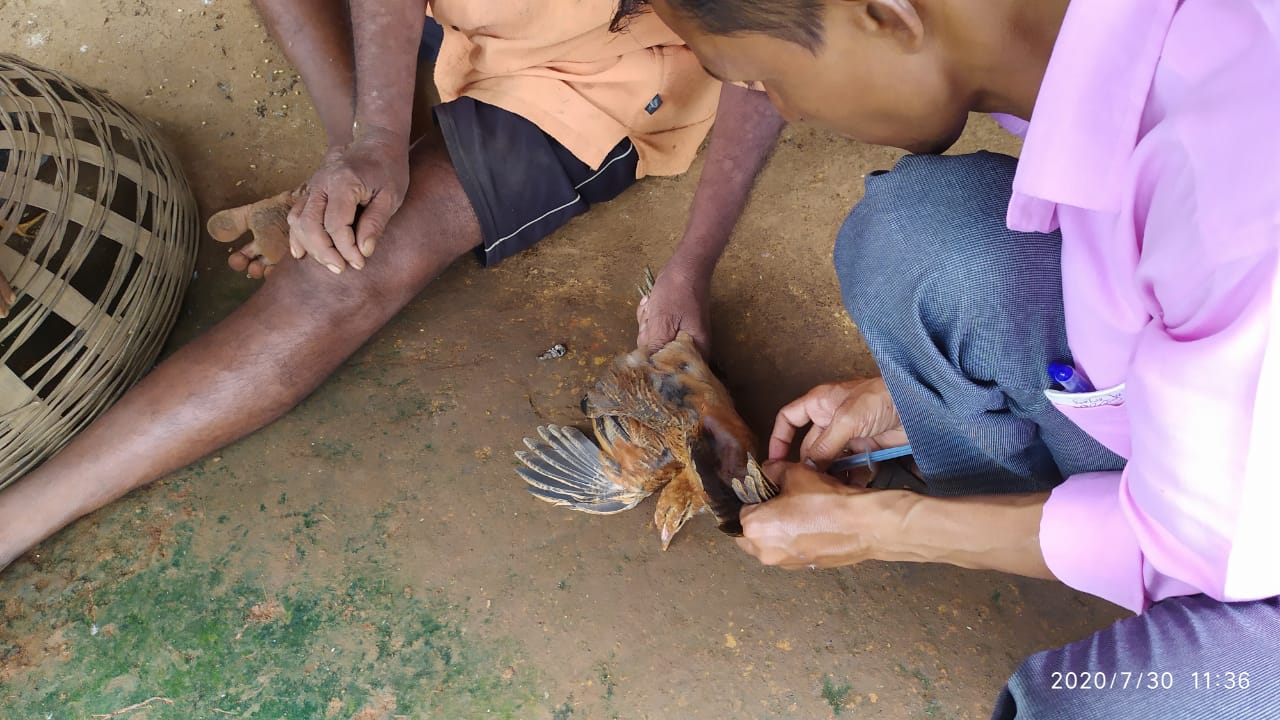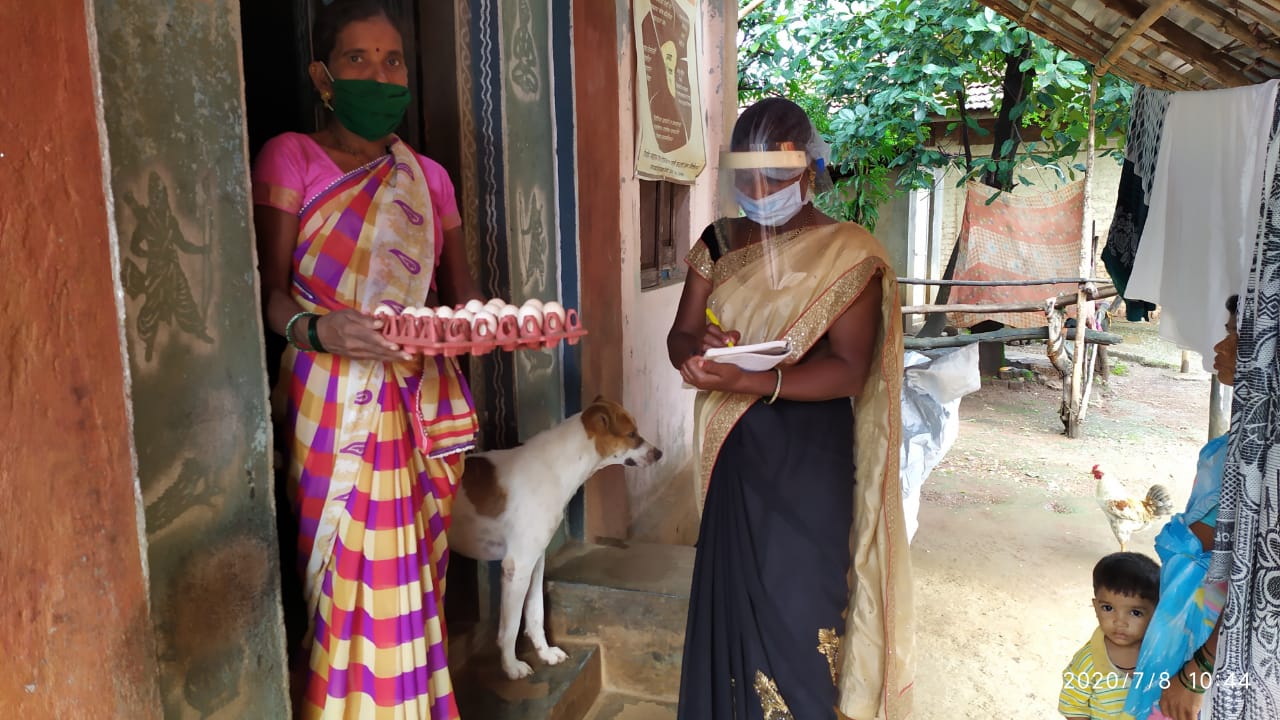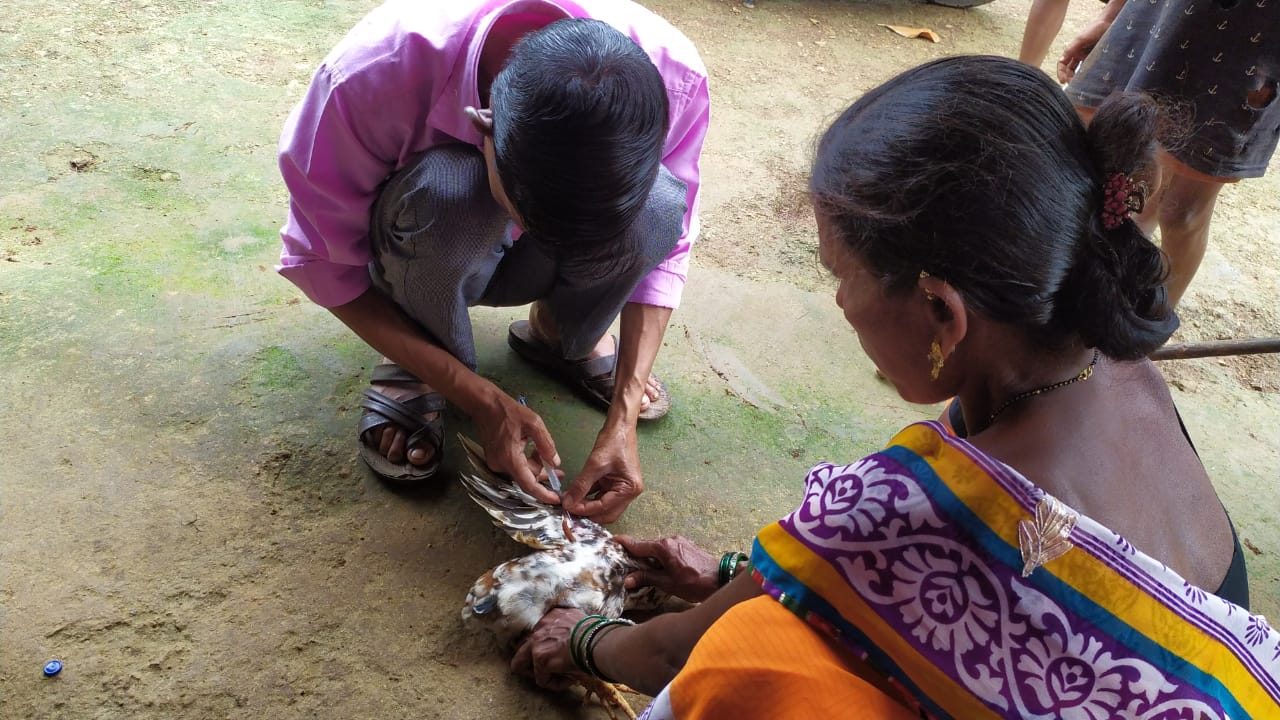
AMCHI

We believe that by empowering communities with information, skills and access to institutions we help them demand quality services from government. When village communities, particularly women, are able to avail quality social development services, the status of women and girls in society improves.
AMCHI (Action for Mobilization of Community Health Initiatives) is a field-based project started in 2007 to pursue the twin goals of community empowerment and motivating service providers to provide quality health and social development services to the community. At the root of our approach is the acknowledgement that quality services are not reaching people not because they are not being provided by the government, but because of the lack of people’s participation in monitoring and ensuring accountability from the service providers. Ignorance, apathy and lack of local leadership are some other factors responsible for it.
Village Micro-planning is an empowering process and is at the heart of the AMCHI Initiative which empowers the community to assess its current socio-economic development status, analyse the factors responsible for it, and work towards developing an action plan to address the issues through community participation and alliance building with Government and other agencies. We initiated the village micro-planning activity, involving the four ‘A’ s in 2004 in Shahapur block of Thane District with funding from UNFPA under its Integrated Development Project. It was re-launched as AMCHI in 2007 with funding from Mahindra & Mahindra and HDFC. Till date we have covered 285 villages and worked with eleven Primary Health Centers (PHC’s) across two talukas of Thane and Raigad districts. We are currently working in five PHCs including Gadab, Poynad, Washi, Salav, Vashind in Shahapur. We continue to maintain our interaction in three more PHC areas viz., Shendrun, Kinhavli, and Taaki Patar from our past projects. A new project is launched in 82 villages under the Dolvi and Salav steel plant areas of Jindal Steel Works in Raigad district.
All these activities help highlight and strengthen:
1.The role of village level service providers in ensuring quality services.
2.Entitlements of the people under the various schemes of the government.
3.The roles and responsibilities of the village level monitoring committees.
4.The changing social development scenario in the village and the need to bring change in a planned and systematic fashion.
5.The role of the village community in working in tandem with the government service providers.
6.The youth and women’s groups and their role in social development initiatives.
We measure our success by the emergence of local leadership and the revitalization of the local institutions. Only then are the social development action plans owned and pursued by the community on a sustainable basis.
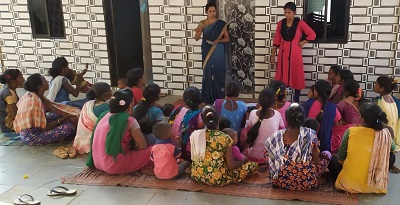
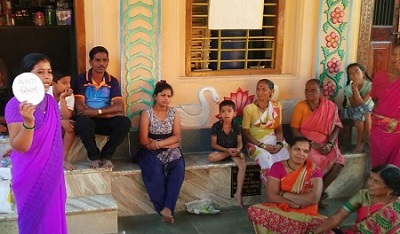
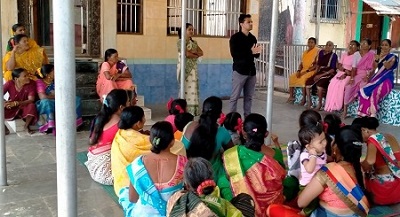
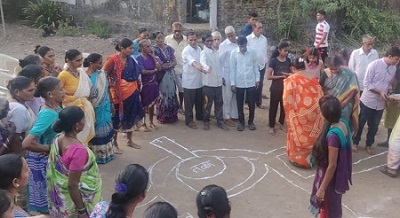
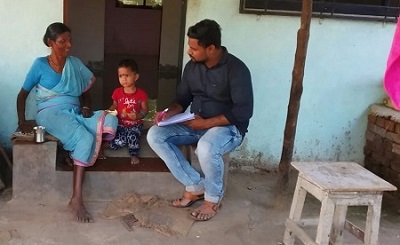
Though mandatory under the law, Mahila Gram Sabhas (exclusive women’s meetings at village level to discuss development issues) are not held. Population First promotes Mahila Gram Sabhas by creating awareness among women about their rights and responsibilities. Women are encouraged to organize the Mahila Gram Sabhas and place their views on community development issues.
The Mahila Gram Sabhas are planned so as to disseminate information and allow discussion on subjects like health, sanitation, unauthorised encroachment and the various central, state and district level schemes like Nav Sanjivani Scheme, Maharashtra Rural Employment Guarantee Scheme (MREGS), Mahatma Gandhi National Rural Employment Guarantee Act (MNREGA) so on and so forth.
Our intervention has been successful in empowering more than 500 women from 20 villages by creating awareness regarding their rights and providing them the skills to exercise them through Mahila Gram Sabhas. They are also actively organizing and participating in village meetings where hitherto, only men have been the decision makers.
Fund & Support: The cost of one Mahila Gram Sabha is Rs. 30,000/- Please Contact Us to support this activity.
We are discussing our issues for the first time in a Mahila Gram Sabha. Earlier men did not let women speak and women were scared of expressing their opinions. Now women will start speaking in front of men.
We will be present in larger numbers for the August 15th Gram Sabha and present our views on various issues. We will also organize a Mahila Gram Sabha before the next general Gram Sabha on 2nd October.
It is necessary for women to participate in the village development process and Mahila Gram Sabha is the best way to do so. In the workshop organized by PF the women have come to know about their right for Mahila Gram Sabha. I will help them in conducting Mahila Gram Sabha before every Gram Sabha.
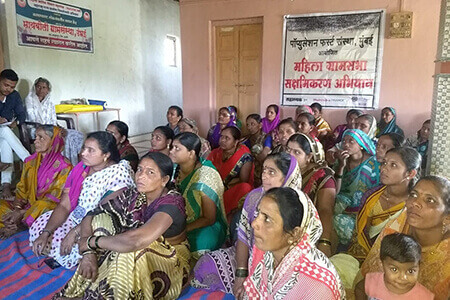
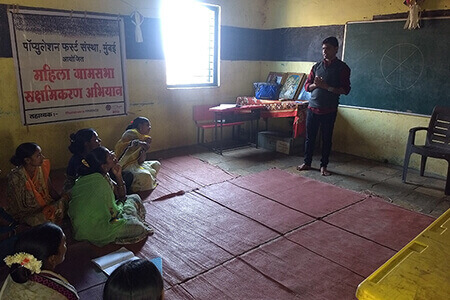
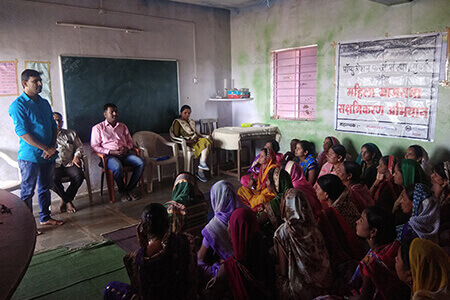
Strengthening Village Level
Committees
Similarly, the various village level committees such as Paani Puravtha Samiti (Water Supply and Maintenance Committee), Dekhbal Durusti Samiti (Village Development and Management Committee), Mata Palak Samiti (Mother and Guardian Committee), PESA Committee, Village Health Sanitation and Nutrition Committee (VHSNC), School Management Committee (SMC) are ineffective in monitoring the performance of the service providers - teachers, Anganwadi Workers (AWWs), Health personnel, Panchayti Raj Institution (PRI) members etc. AMCHI undertakes training programmes for the members of these village level committees to create awareness about the roles and responsibilities of the committees and to build their capacities to play a pro-active role in village development initiatives.
Fund & Support:The cost of one village level committee meeting is Rs. 25,000/- Please Contact Usto support this activity.
Since we participated in the staff training by PF, we had been waiting for PF interventions. I am very happy that PF will help us for immunization session, and we will help PF conduct sessions on immunization day.
I am very happy that Population First (PF) will talk about issues like malnutrition, sanitation, and mother and child health...
AWW of Khanduchiwadi and villagers conducted very nice meeting with help of Grampanchayat and adolescent girls on malnutrition. Today I realized the seriousness of the issue and got many ideas for conducting similar activities - parents meetings,etc, in my village for eradication of malnutrition.
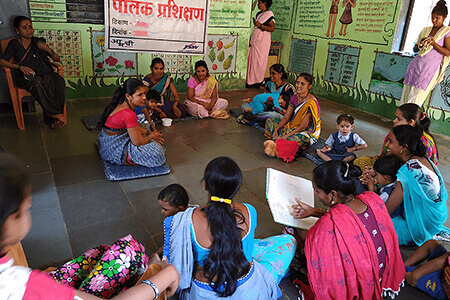
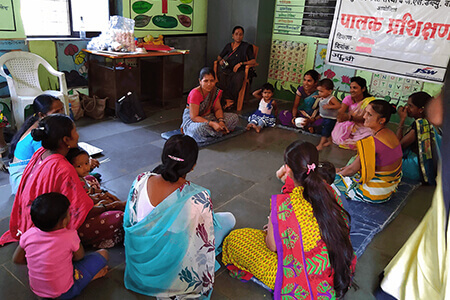
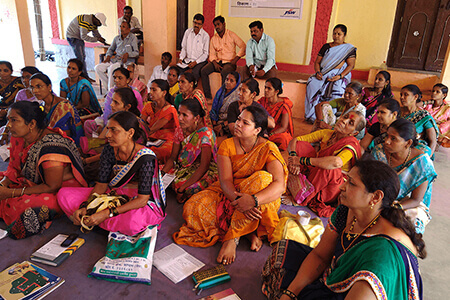
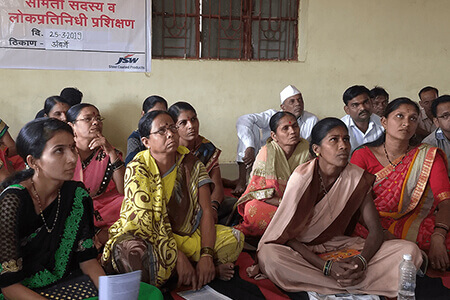
Capacity Building of Gram
Panchayat Members
Panchayati Raj—the grassroots representation of democratic governance—was established in the country with the aim of providing a system that aids community participation. Through its Gram Sabhas and with the help of Sarpanch and Gram Sevak the community can discuss issues, identify solutions and bring about development and growth of a village.
However, it was observed that the Gram Sabhas were not conducted properly and members were not aware of their responsibilities in most villages. Most of the Panchayati Raj Institution (PRI) members had never received any training and had little knowledge about budgeting, existing developmental schemes, PESA (The Provisions of the Panchayats Extension to Scheduled Areas Act) fund, Vitta Aayog (Finance Commission) etc.
Therefore, to emphasize the powers and responsibilities vested in PRI and to build a transparent and accountable system for the development of the village, PRI trainings were organized. The training provides basic information regarding conducting the Gram Sabhas / Mahila Gram Sabhas and preparing proposals and budgets under different schemes.
Fund & Support:The cost of one Capacity Building Training for PRI members is Rs. 35,000/- Please Contact Us  to support this activity.
I attended the first training in three years after formation of PESA committee! I did not know that separate Gram Sabha under PESA should be conducted. It is very empowering to know that PESA Gram Sabha can give license for selling forest products especially liquid products like gum and sap...
The session on Mahila Gram Sabha was very good. We received new information regarding the yearly action plan. Till date, I had no information regarding the same. Now, I will further disseminate this information to the rest of the women folk in my village and make sure that the village action plan is developed.
I am really thankful to PF for conducting training (on budgeting) in the village. The training gave me the responsibility to prepare budget for our village. I will teach this to all PRI members and next year my GP will submit best budget for village development.

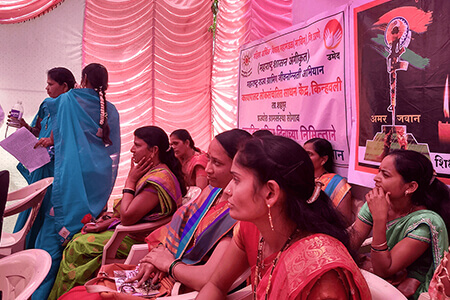
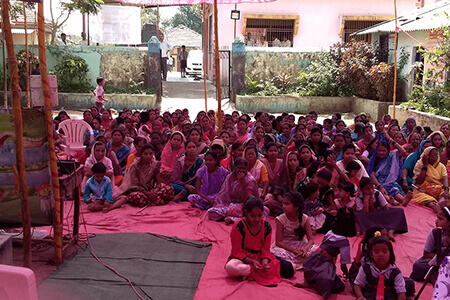
AMCHI, has been organizing health camps in the villages regularly with the support of government health service providers. The aim of the camps is not just to provide health services to the needy but to create an environment where the whole community gets sensitized about health issues. The camps typically include interactive sessions with youth and children on health issues, counseling for adolescents and film screening and entertainment programme with messages on health and well-being. The well attended health camps organized in collaboration with the health institutions demonstrate to the service providers how health issues can be communicated to the community in an interesting and interactive fashion.
Theatre Workshops for Service Providers
Apart from health camps, we have also, conducted theater workshops in the past for the health service providers. Even though government agencies are equipped with necessary knowledge to deliver health related services, they possess limited skills on its effective communication and health education. AMCHI trained the government representatives of the Primary Health Centres and Sub-centres as well as semi-governmental representatives such as ASHA, ANM, MPWs, ANM Supervisors, doctors, in communication skills including counseling, using theatre-based techniques. These workshops have helped health staff to look at themselves as agents of positive change in their villages and part of the overall development process.
Fund & Support: The cost of implementing maternal care workshop in one village is Rs. 20,000/- Please Contact Usto support this activity.
We used to get immunized but didn’t know which vaccine for what purpose. After watching the film I understood it and would remember it as well.
My daughter was suffering from cold, cough and fever from last two weeks. PHC is 10 Km away from my village, there is no transport facilities from my village and I was unable to bring her at PHC for treatment, I was worried because she had started to lose weight. But today's checkup was like life line for her, I am thankful for PF and the doctor.
...Katkari tribal community in the wadi have parents who work as laborers and go out for work. They are unable to spend money in hospital for treatment. Therefore, this health camp in the village was really helpful to save lives of the tribal children.
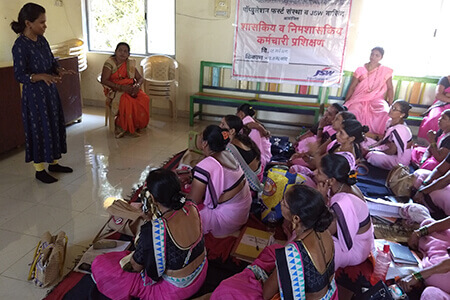
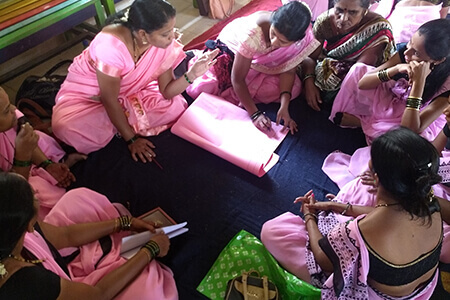
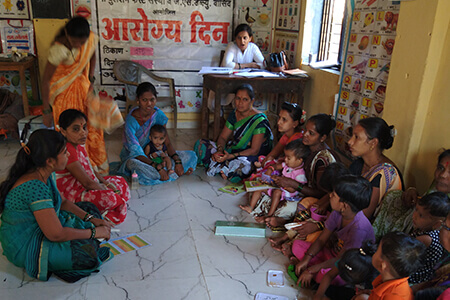
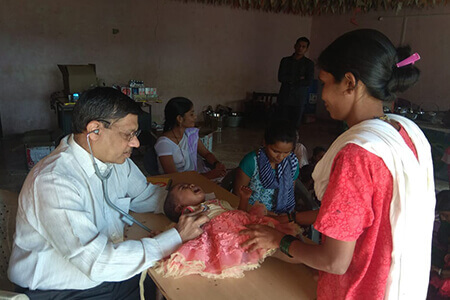
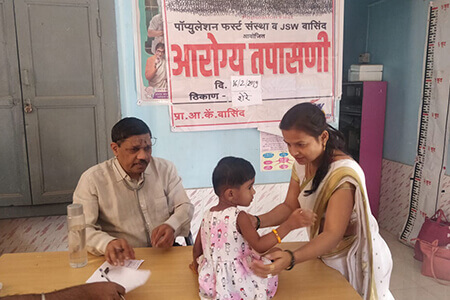
Maternal Health
Shahapur block registers high incidence of infant and maternal morbidity and mortality, especially in tribal villages. Therefore, it is important to educate pregnant women and nursing mothers on ante-natal and post-natal care. Their families and communities need to be sensitized towards women’s health issues to ensure safe pregnancy and motherhood. Sessions are conducted regularly on topics like immunization, nutrition, adequate rest, supplementation, breast feeding, contraception, etc. where the Anganwadi worker, ANM and ASHA are involved to enhance their skills to communicate with women on these issues effectively.
Fund & Support: The cost of implementing maternal care workshop in one village is Rs. 20,000/- Please Contact Usto support this activity.
I am pregnant for 6 months now, but I did not eat iron tablets and was not eating non-veg, but today I understood I have to take iron tablets and need to eat proper nutritious food for my safety.
I was very confused how to feed the baby. I tried as my mother guided me but it was not working. Today through the film I understood how to hold my baby during feeding.
I was very afraid of breastfeeding the new born baby...But today I watched the video clip and understood how to do it. I also understood importance of first feeding within one hour. So, I will keep in mind and will breastfeed baby within half hour after delivery.”
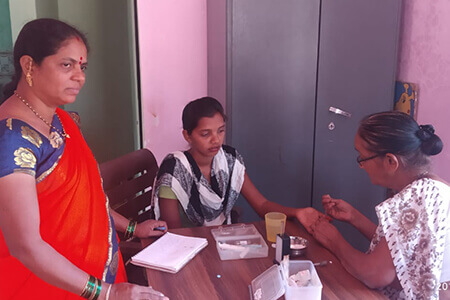
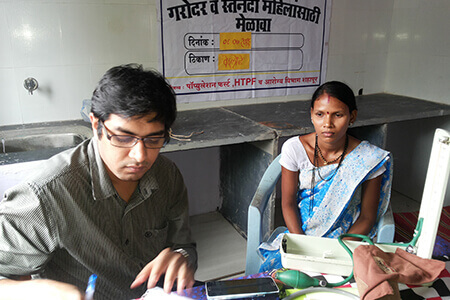
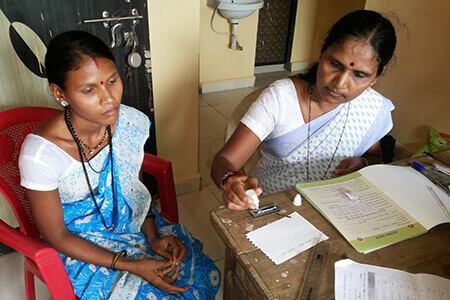
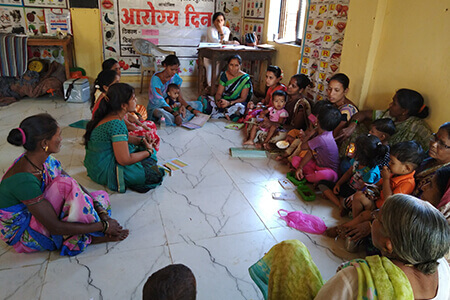
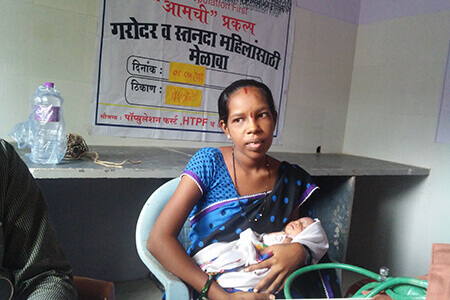
The interventions undertaken to address malnutrition emphasizes on behaviour change amongst the Anganwadi workers and the parents. The parents are the key target group since the health of the children depends to a large extent on the attention being paid by parents towards the dietary and hygiene practices at home. Also, proper utilization by the Anganwadi Centres of the available resources in terms of funding and supplementation obtained from the ICDS department plays a crucial role in formulating strategies to combat malnutrition in these villages.
Regular meetings are also held at village level in collaboration with existing institutions such as the Anganwadi Centres, PHC’s, Sub-centres, etc. for parents, community members, and health service providers focusing on addressing malnutrition among children.
Fund & Support: Cost of implementing this programme in one village is Rs 25,000 per month.
Please Contact Us to support this activity.
Once I asked AWW why height and mid arm circle was taken every month and the AWW had replied that the record needs to be kept. But today I understood it is not only about record it is about undernutrition and we have to read nutrition status of our children through the chart of height and scale of mid arm circle.
I will work for formation of Mata Palak committee. Committee will be formed in the next meeting and I would like to be the president of the committee. I will monitor the food and timing of Anganwadi Center on regular basis.
We always thought for good nutrition we need to spend lot of money to purchase various things but today I understand forest fruits, vegetables and rice which we grow as well as rainy season vegetables have more nutrition. We just need to make different kind of recipes to give our children good nutrition


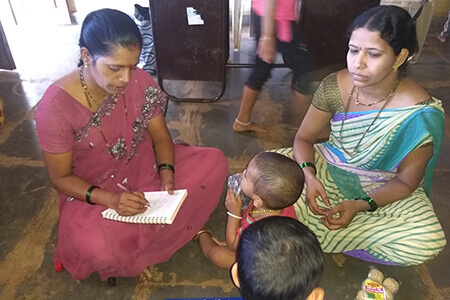
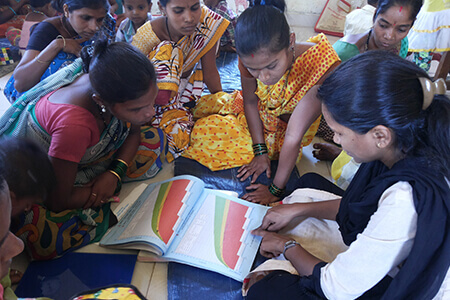
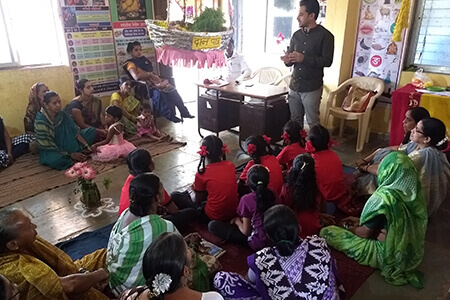
Adolescent Reproductive and
Sexual Health
Most villages are tribal, remote and lagging in development; hence, their social development indices are poor. There are no mechanisms to reach out to youth with correct information regarding sexual and reproductive health. This is particularly important as instances of child marriage, risk behaviours like having unprotected sex leading to adolescent pregnancies and unsafe abortions are often observed. The Adolescent Reproductive and Sexual Health (ARSH) programs, therefore, involve regular interactive sessions with adolescent girls and boys to familiarize them with not just the body and its functions, but also the skills required to make informed decisions like assertive communication, negotiation, leadership and alliance building.
The PF team coordinates with Anganwadi workers to provide nutrition services to adolescent girls and pregnant and lactating women. Simultaneously the team works towards empowering the adolescents by providing them life skills and information about sexual and reproductive issues. The workshops provide a social space which is non-judgmental, open and responsive to their needs where they can talk about their own lives and learn how to deal with it. Issues to do with physical relationships, pregnancies out of wedlock and contraception are the core areas of concern for girls in many villages.
ARSH sessions include discussions, question-answer sessions, lectures, demonstrations, practical exercises and games. They are conducted in villages on a regular basis and cover:
Personal hygiene, nutrition, sexual and reproductive rights and responsibilities, changes during adolescence/puberty, STD and HIV/AIDS awareness, responsible parenthood and curbing addiction.
Fund & Support: The cost of a day-long ARSH workshop for 40 students is Rs. 25,000/-
PleaseContact Us to support this activity.
We need information about reproductive and sexual health. All of us will attend these sessions because we have no space in the village to know or talk about our personal health.
I have been trained on the subject but I am not able to give information apart from menstrual hygiene. Daivashala Madam has explained all the topics (concerned with ARSH and life skills) so well.
I hated my menstruation. So, I felt very irritated on my period days. After the training I understood that menstruation is sign of my power of motherhood so why should I hate on it. Training changed my attitude.

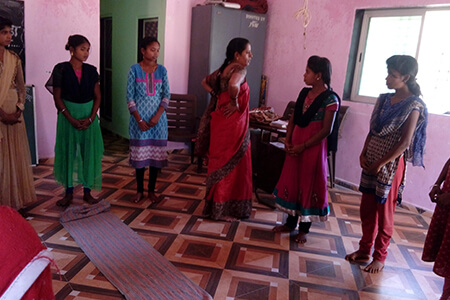
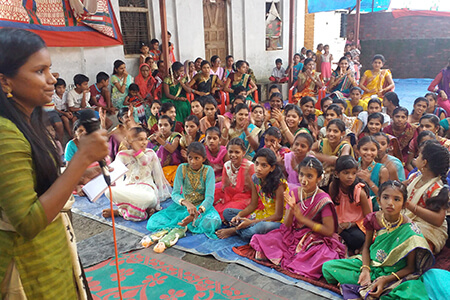
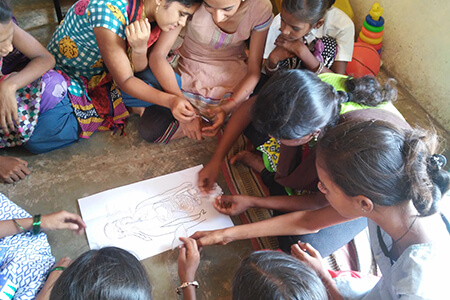
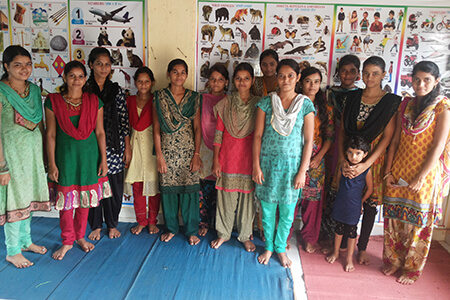
School In Development
Programme
School in Development (SID) programme transforms school children into ‘messengers of change’ (Vikasdoot) for health and sanitation issues in the villages. The SID programme is an intense 5-day training programme which engages 40 select students from the 5th to 7th standard of Zilla Parishad schools in interactive activities to communicate health and hygiene messages. The training program also focuses on building communication skills, team building, leadership skills, collective decision-making and understanding the functioning of the local government systems at the village level. The program culminates in constituting a Bal Panchayat through due election process among the students. The elected Chief Minister and the cabinet members take responsibility for improving hygiene behaviour and ensuring good sanitation at personal, school, household and community level. Each child monitors health and hygiene practices in five households.
Two Thousand Five Hundred students from 60 Zilla Parishad schools underwent an intensive five-day training focused on building leadership and communication skills through its Vikasdoot programme since its inception in 2011. SID trained students, facilitate construction of soak pits, compost pits, toilets and kitchen gardens. So far 6500 soak pits, 4900 toilets and 8500 kitchen gardens are constructed with the initiative of the vikasdoots in the villages. Training also focuses on seven points of cleanliness viz., personal hygiene, and cleanliness of neighbourhoods, household cleanliness, food hygiene, waste water management, solid waste management, garbage management, and potable water.
Population First launched a campaign called ‘Chacha Nehru Vikas Premi Abhiyan’ in 2011, to keep ‘Vikasdoots’ motivated and to channelize their immense talent and energies constructively. Under the campaign, Vikasdoots took up various sanitation initiatives in their schools and villages and were awarded for their efforts in our ‘Balmelava’ event. This event has continued to be one of our major events showcasing the interest of the students and teachers to contribute to their school and community development.
Fund & Support: : By contributing Rs. 75,000/- you would be supporting the five-day Vikasdoot Training Programme, as well as monitoring of their SID activities for one year for one school. Please <a class="color-red" href="http://populationfirst.org/contactus/"Contact Us to support the activity.
The building material for toilet was lying in my house but the work was not starting due to one or the other reasons. Vikasdoot Sonalli Patekar followed up with me persistently and made me start the construction. Thanks to her I have built the toilet in my house
As part of the Vikasdoot Program, the children, approached the Gram Panchayat and Shala Vyvasthapak Samiti for school ground facility and showed interest in tree plantation in their campus which was positively reciprocated by the Gram Panchayat and the Samiti.
The process of election—nomination, contesting, and formation of the governing body—was understood very well by the students through the Bal Panchayat activity set up under the Vikasdoot Program.

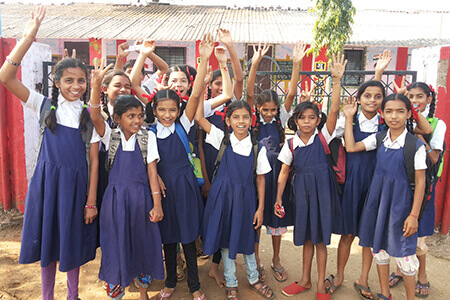
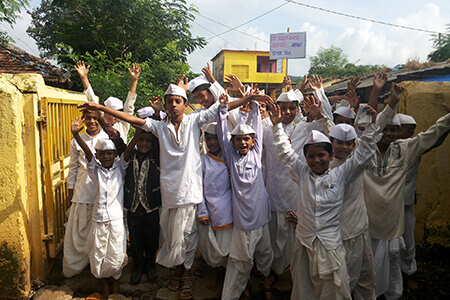
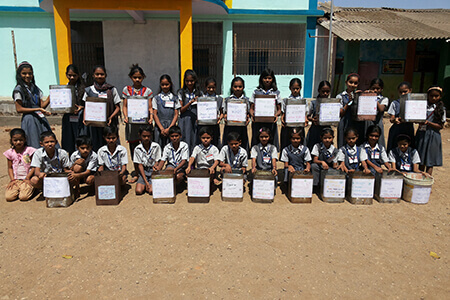
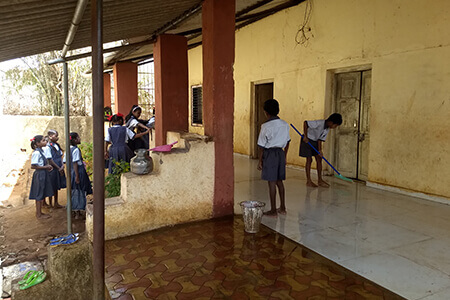
Amcha Gaon
Amchi Shaan Campaign
‘Amcha Gaon Amchi Shaan’ (AGAS) was launched in 2007. Sustainable development of the Indian villages can be attained only when the community is actively involved in the development process. The ‘Amcha Gaon, Amchi Shaan’ (AGAS) campaign was initiated as an inter-village contest where a village identifies 2 to 3 issues requiring immediate attention and develops a strategy to address the issue. The winners under various categories are selected not just on the basis of the impact of their initiative but also on the basis of the sustainability and collective responsibility that the activity elicited. Population First uses this award ceremony to recognize sustainable development in villages and motivate responsible groups to continue their efforts.
Fund & Support: By contributing Rs. 5,00,000/- you would be supporting the year-long AGAS campaign.Please Contact Us to support this activity.
It is a means to motivate the villagers to work for their well-being and bring the spotlight on pertinent issues that need to be addressed collectively, motivate various groups like SHG, health committee, anganwadis etc. to perform better and recognize the efforts put in as well as strategies adopted by the villages in various areas of development
...Population First’s work has been able to create an atmosphere of positive change related to health issues in Shahapur. Health Department will support the organization in all its endeavours in future.
We revived the Village Water Supply and Sanitation, Health and Nutrition committee by conducting regular meetings. The committee members now have more clarity on their roles and responsibilities.
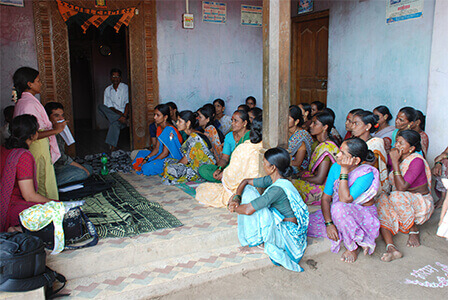
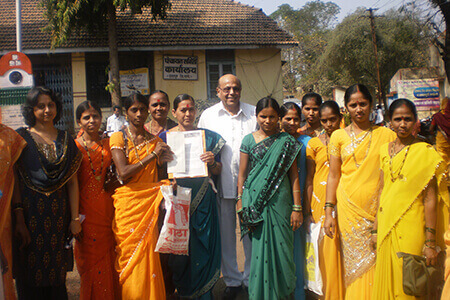
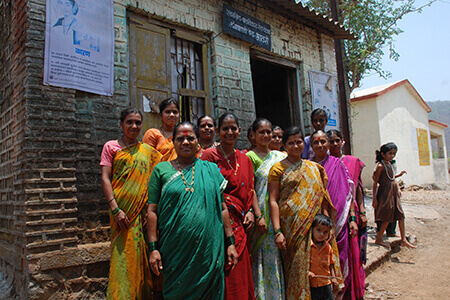
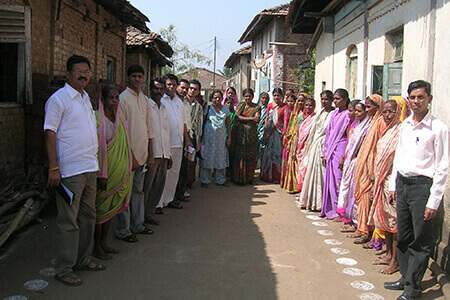
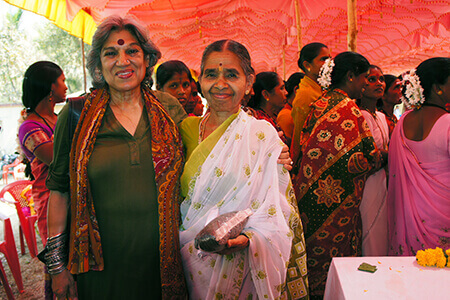
Vermi-Composting
Livelihood Initiative
'Financial independence is a crucial element of empowerment, which enables women to become decision-makers at home and in their community. AMCHI began exploring income generating options for rural women which are easy to learn and relevant to the needs of their village. Women were keen that their work should not interfere with household and agriculture chores and other responsibilities.
Thus, began our journey in vermi-composting and vermi-wash production at village level where AMCHI teaches the women how to produce, operate, maintain, market and sell the vermi-products. The women have enthusiastically taken up the initiative and have gained hands on experience from constructing their own pits with the help of the community mason to maintaining, loading and unloading the pits, as well as promoting and marketing the produce. They are also encouraged to apply vermi-products on their own farms and kitchen gardens.
Additionally, AMCHI team also facilitates demonstration for farmers who are interested in using vermi-compost and vermi-wash in their fields. This demonstration, for farmers especially, acts as a pilot project before committing to buy the vermi-products from the women’s groups.
Currently, approximately 500 women from 55 women’s groups are engaged in the vermi-composting project earning an average income of Rs 4,500-5,500 per month per group.
Fund & Support: By contributing Rs 1,00,000/- you would be supporting the construction, operation and maintenance of pits and building of pucca shelter for one vermi-compost unit. Please Contact Us to support the activity.
I have spent lot of money on chemical manure in the past and never knew about its ill effects on the soil. Listening to the experts in the melava, made me realize how much I am spending to destroy my own soil!
I congratulate Population First not only for mobilizing women groups and equipping them to produce vermi-compost manure, but for the fact that PF has played a vital role in promoting organic farming amongst the farmers. Now, I believe women can change the culture of farming.
Before joining Aamch Mahila Gandulkhat Prakalp - vermicomposting group, I was just an aaya who was taking care of the children. There was no space for me to talk and take decisions. But after joining this livelihood initiative and earning my own income I have become a decision maker of my family.

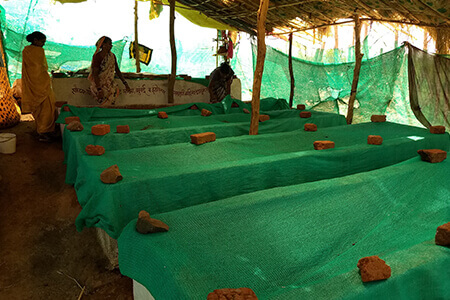
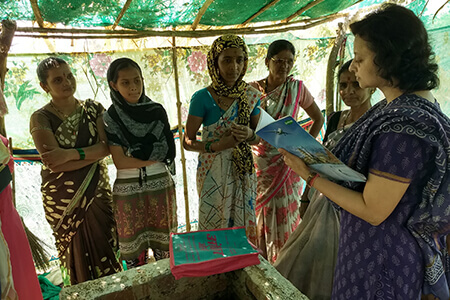
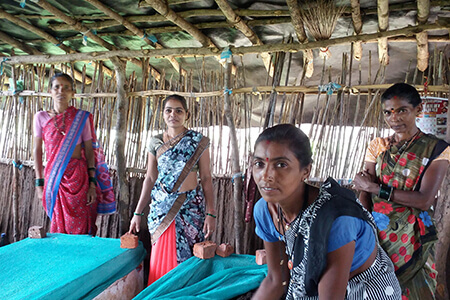
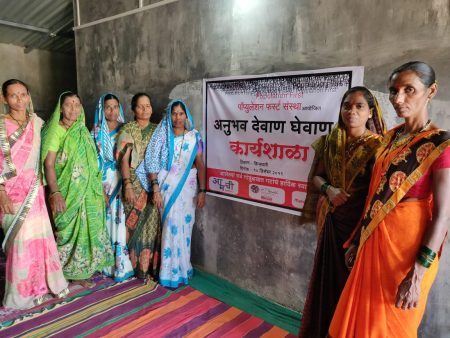
It is crucial that livelihood opportunities in rural areas utilize the resources at hand. Therefore, rural tourism was a perfect opportunity for the people of Dehna. Dehna, a great monsoon destination, was a singular destination in Shahapur region for introducing the urban and international tourists to the sights and culture of rural India. Population First collaborated with GrassRoutes, a social enterprise, and introduced the concept of hospitality services to the people of Dehna as an effective method of earning additional income for their community.
A comprehensive training was conducted focusing on hospitality, tourism, and project management for the tribal youth, men and women of Dehna. GrassRoutes provided the much-needed infrastructural and logistical support such as developing hiking paths, tourism guides, accommodation and travel aspects for the rural tourism project whereas Population First focused on training and skill development of the community to carry forward this project.
This project was initiated with support from the Royal Bank of Scotland (RBS) Foundation.Log In Here to Book your Tour

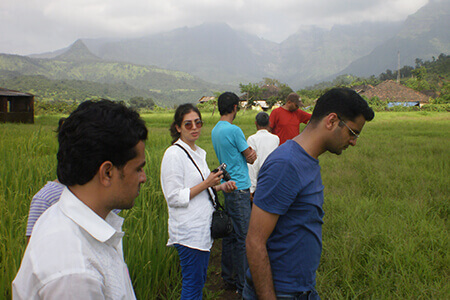
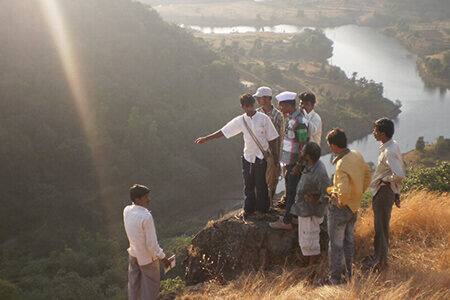
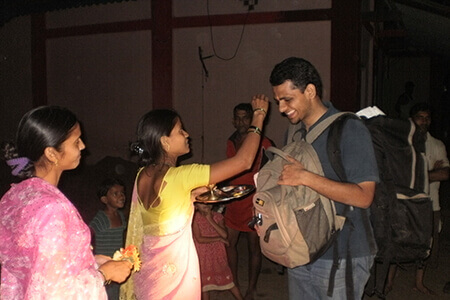
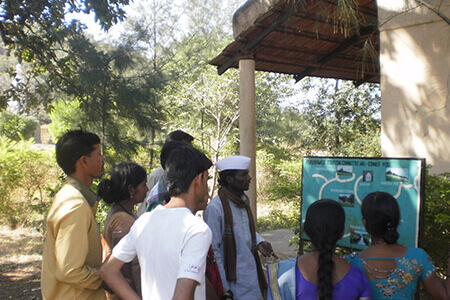
While working on a malnutrition intervention in a small tribal hamlet, Khanduchiwadi, it became evident that lack of regular source of income and lack of access to nutritious food options was the cause behind their poor nutrition status. However, it was found that the community was aware of and had experience in traditional poultry farming techniques. Eggs being an important source of protein, it was decided to work on promoting poultry farming in the village.
And thus, began the journey of Poultry Farming intervention under Population First – our first ever self-funded project. Converging the need for income generation with change in nutritional status of the vulnerable women and children
became the core aim of the project. Having finished need assessment, 18 women were identified from the community, and were trained and provided with 10 chicks each by January 2020. The eggs initially were consumed by the women and their families and sold to the neighbours. However, with increase in number of eggs produced, AMCHI team created linkages between these women and the Anganwadi Center as well as their village market to which the women started selling the eggs.
This intervention came into its own in the context of COVID-19 pandemic that hit the entire world and in the environment of nation-wide lockdown that had caused severe breaks in supply chains and economy across the country. When there was no access for Anganwadi Center to procure eggs, which is an essential component of the nutrition supplements supplied under the Amrut Aahar Yojana scheme by the government for the children, pregnant and lactating women, the locally produced organic free range eggs came to the rescue.
The women sold the eggs to two new Anganwadi Centers from neighbouring villages – Musai and Shidpada, and Shenwa Market. It provided the women the much needed cash to tide over loss of work in the Covid context and the needy women and children their nutrition.
The plan is to upscale this low-cost, sustainable income generation activity in three more villages.
Fund & Support: By contributing Rs. 30,000/- you would be supporting the training, operations & maintenance of the project in one village for one year. Please contact us to support the activity.
